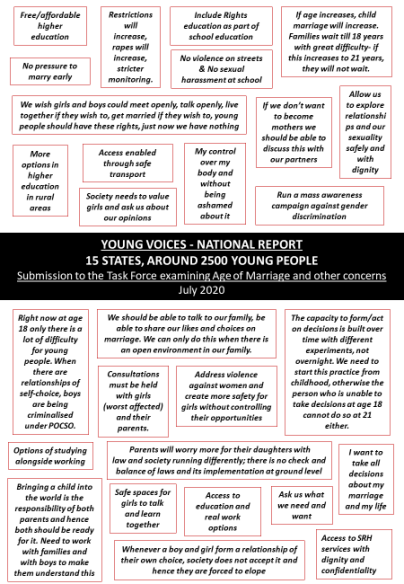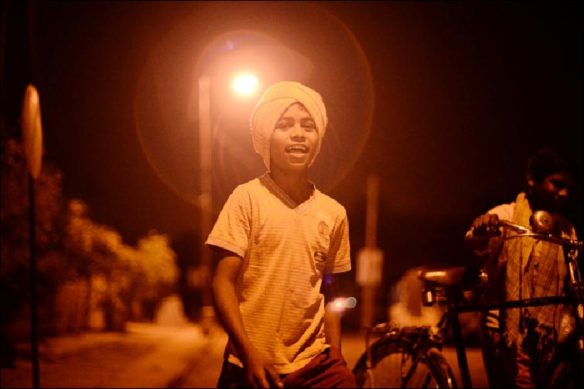Young Voices National Report (15 States, nearly 2500 young people): Submission to the Task Force examining age of marriage and other concerns, July 2020
Posted on July 25, 2020
On June 23rd, 2020, it was learned that the Ministry of Women and Child Development of Government of India had set up a Task Force to examine matters pertaining to the age of motherhood, particularly maternal mortality rate (MMR) and nutritional levels, with a mandate to provide recommendations for legislative response by July 31, 2020.
Considering the remit of the Task Force to examine the correlation between age of marriage and motherhood with key health, medical, wellbeing and nutritional status as well as higher education of girls and young women, 96 civil society organisations that uphold rights of young people, including their right to be heard on all matters that affect their lives, collectively initiated the ‘Young Voices’ process on June 26th, 2020. Within the three weeks that followed its commencement, ‘Young Voices’ was able to involve around 2500 children, adolescents and youth in rural, peri-urban and urban areas, predominantly from the most marginalised communities across 15 States. A significant number of them are involved in individual and collective activism. The facilitating organisations of ‘Young Voices’ work with issues such as child rights, human rights, gender equity, sustainable development, democratic governance and social justice, in different states and include state and national alliances.
Within the three weeks that followed its commencement, ‘Young Voices’ was able to consult around 2500 young people from 15 States, namely Odisha, Uttar Pradesh, Delhi, Rajasthan, Madhya Pradesh, Gujarat, Bihar, Jharkhand, Uttarakhand, Tamil Nadu, Karnataka, Kerala, Telangana, Punjab and Haryana. Young people from West Bengal and parts of Karnataka could not take part as they were severely affected by Cyclone Amphan and floods. They are in the age group of 12 to 22 years with a few older youths, from varied backgrounds. While participation Rights are universal, the ‘Young Voices’ process prioritised young persons from marginalised communities who are systemically distanced from all decision-making processes. Hence the emphasis was to reach young people from socially, economically and politically vulnerable situations. A large number of them are girls and youth from impoverished rural areas and urban slums; from ST, SC, OBC and minority communities.
Passionate about the matters under discussion, the young people took part in the consultations against severe odds. Despite Covid-19, despite lack of appropriate technologies for remote participation, despite losing their daily wages – they contributed their time, their experiences and their thoughts with remarkable courage, honesty and insight. The young persons were facilitated to share their views through interviews, focus group discussions, google surveys, life stories and spoken messages. Some organisations hosted state-level webinars where young people spoke with and listened to each other across districts. The methods were chosen on the basis of what was most suitable to the young people as well as what they had access to, in different settings. The facilitating organisations, despite the very limited time frame, drew on all available resources and mechanisms to reach out to as many as possible, amidst the tremendous constraints placed by Covid-19.
It is significant that many of the young people in this process have been part of sanghas, peer-led groups, collective mobilisation. They have personal and organisational histories of having braved many challenges in their own lives and in their communities. Many of them spoke up on behalf of their entire groups, in solidarity. Their views were respected and understood as set in their own unique contexts, eco-systems and aspirations. With their consent, a letter was sent to the Chairperson of the Task Force, with an introduction to the ‘Young Voices’ process, requesting an opportunity for young representatives to interact directly with the members of the Task Force. The letter was acknowledged and we were informed our written submission was welcome.
On July 17th, 2020, 4 representatives of the ‘Young Voices’ process spoke to the Task Force in a webinar. They were Damini, Hardoi, (North Zone), P. Fathimabi, Bellary, (South Zone), Mamta Jangid, Ajmer, (West Zone) and Priyanka Murmu, Saraikela (East Zone). (Their brief profiles are Annexed III) Each one of them fulfilled the criteria that were collectively set, of being from marginalised communities, with a history of activism and engagement with social movements.
During the consultation, the young persons were extremely vocal, articulate and made their points related to all causal issues forcefully. They pointed out how poverty, lack of options, agency, educational opportunities and employment opportunities affects them most. They spoke of girls being seen as a burden, a liability and how that affects their lives. They referred to criminalisation of consensual sexual relationships of young people, the impact COVID is having on their lives – and what needs to be done to support them at these times was also shared. The negative experience from Karnataka where Child Marriage has been made void and how it has led to more harm than good was also shared. All of them were vocal about the challenges they face in their own lives to exert their agency and realise their aspirations. In all, they covered a host of issues to explain how increasing the age of marriage will either harm; or have no impact by itself unless the root causes of women’s disempowerment are addressed.
Read the detailed report here: Final National Report for submission to TF
Read the background and the questionnaire used for facilitating the discussions with the young adults here:
Background: Background-English(YoungVoicesWorkingGroup)_01072020_CWC
Questionnaire: Questions-English(YoungVoicesWorkingGroup)_01072020_CWC
Read the complete profiles of the zonal participants for the national consultation with young adults here: ZonalRepresentativesBriefProfile_YoungVoicesWorkingGroup_July2020
Read the list of 96 organisations who have been associated with the Young Voices process: FACILITATING ORGANISATIONS
Read the list of 2500 participants of the Young Voices process: List of Participants_Young Voices
Read the Young Voices Petition in English here: https://www.change.org/p/ministry-of-women-and-child-development-we-do-not-want-the-minimum-age-of-marriage-of-girls-to-change-from-18-to-21-years
Read the Young Voices Petition in regional languages here:



